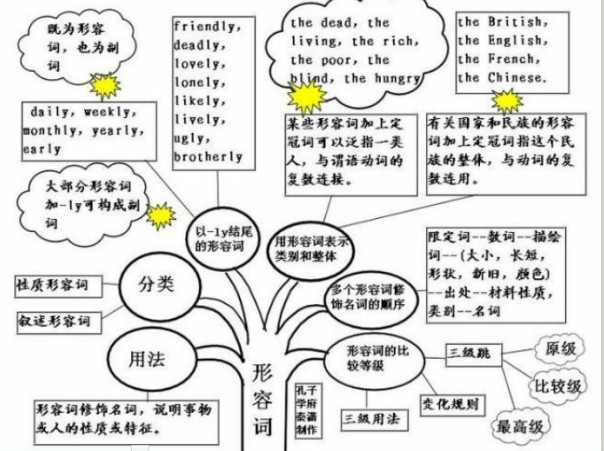本试题 “词汇与完成句子。请根据汉语或首字母提示,或所给词的适当形式填空。1. Her face b (表露出) her nervousness.2. The match was cancelled because most of t...” 主要考查您对形容词
一般过去时
等考点的理解。关于这些考点您可以点击下面的选项卡查看详细档案。
- 形容词
- 一般过去时
形容词的概念:
形容词(adjective),简称adj.或a,形容词用来修饰名词或代词,表示人或事物的性质、状态,和特征的程度好坏与否,形容词在句中作定语、表语、宾语补足语。通常,可将形容词分成性质形容词和叙述形容词两类,其位置不一定都放在名词前面。
形容词的作用与位置:
形容词是用来修饰名词的,常被放在名词前作定语,或放在系动词后面作表语。以下属几种特殊情况,须牢记;
(1)形容词短语作定语,定语后置。
如:a language difficult to master,
a leaning tower about 180 feet high
(2)表语形容词(afraid、alike、alone、asleep、awake、alive等)作定语,定语后置。如a man alive。有些表身体健康状况的形容词如well、faint、ill只作表语。sick既可作表语又可作定语,ill如作定语意为“bad”。
(3)用作定语,修饰由不定代词one、no、any、some和every构成的复合词如anything、something等时,通常后置。
如:I have something important to tell you.
(4)else常用作疑问代词和不定代词的后置定语。
(5)enough、nearby修饰名词前置或后置,程度副词一般位于形容词、副词前面,enough修饰形容词、副词时,必须后置。
(6)几个并列的形容词作定语,其语序通常为:限定语(The、A)+描绘性形容词+size(大小)+shape(形状)+age(年龄、时间)+color(颜色)+origin(国籍、来源)+material(材料)+purpose(目的)+名词。
口诀:
限定描绘大长高,形状年龄和新老;颜色国籍跟材料,作用类别往后靠。
如:a heavy black Chinese steel umbrella,
the man's first tow interesting little red French oil paintings
形容词的用法:
1、形容词修饰名词,说明事物或人的性质或特征。通常,可将形容词分成性质形容词和叙述形容词两类,其位置不一定都放在名词前面:
1)直接说明事物的性质或特征的形容词是性质形容词,它有级的变化,可以用程度副词修饰,在句中可作定语、表语和补语。例如:hot热的。
2)叙述形容词只能作表语,所以又称为表语形容词。这类形容词没有级的变化,也不可用程度副词修饰。
大多数以a开头的形容词都属于这一类。例如:
afraid害怕的。(错)Heisanillman. (对)Themanisill. (错)Sheisanafraidgirl. (对)Thegirlisafraid.
这类词还有:well,unwell,ill,faint,afraid,alike,alive,alone,asleep,awake等。
3)形容词作定语修饰名词时,要放在名词的前边。但是如果形容词修饰以-thing为字尾的词语时,要放在这些词之后。例如:somethingnice
2、用形容词表示类别和整体:
1)某些形容词加上定冠词可以泛指一类人,与谓语动词的复数连接。如:the dead,the living,the rich,the poor,the blind,the hungry The poorarelosinghope.穷人失去了希望。
2)有关国家和民族的形容词加上定冠词指这个民族的整体,与动词的复数连用。如:the British,the English,the French,the Chinese. The English have wonderful senseofhumor.
以-ly结尾的形容词:
1)大部分形容词加-ly可构成副词。但friendly,deadly,lovely,lonely,likely,lively,ugly,brotherly,仍为形容词。改错:
如:(错)She sang lovely.
(错)He spoke to me very friendly.
(对)Her singing was lovely.
(对)He spoke to me in a very friendly way.
2)有些以-ly结尾既为形容词,也为副词。 daily,weekly,monthly,yearly,early .
如:The Times is a daily paper.
The Times is published daily.
形容词知识体系:

复合形容词的构成:
(1)形容词+名词+ed:
如:kind-hearted 好心的,white-haired 白发的
(2)形容词+形容词:
如:red-hot 炽热的,dark-blue 深蓝的
(3)形容词+现在分词:
如:good-looking 好看的,easy-going 随和的
(4)副词+现在分词:
如:hard-working 勤劳的,fast-moving 快速转动的
(5)副词+过去分词:
如:hard-won 得来不易的,newly-made 新建的
(6)名词+形容词:
如:life-long 终生的,world-famous 世界闻名的
(7)名词+现在分词:
如:peace-loving 爱好和平的,fun-loving 爱开玩笑的
(8)名词+过去分词:
如:snow-covered 白雪覆盖的,hand-made 手工的
(9)数词+名词+ed:
如:four-storeyed 4层楼的,three-legged 3条腿的
(10)数词+名词(名词用单数):
如:ten-year 10年的, two-man 两人的
一般过去时的概念:
一般过去时表示过去某个时间里发生的动作或状态;过去习惯性、经常性的动作、行为;过去主语所具备的能力和性格。
一般过去时的用法:
1、表示过去发生的动作或存在的状态,常与表示过去时间的副词如:yesterday,last week,two hours ago等连用。
如:My family moved here five years ago. 我家五年前搬到了这里。
I was born in 1973. 我生于1973年。
2、表示过去一段时间经常或反复发生的动作。这时可与频度副词如:often,usually,always等连用。
如:He always worked in tonight those days. 那些日子他总是工作到深夜。
I often left on business in 1987. 1987年我经常出差。
注:表示“过去经常,而今不再”时,要用usedto.
如:I used to read newspaper after breakfast. 我过去经常早饭后看报纸。(意指现在已不是这样)
The children often swam in this river. 孩子们过去经常在这条河里游泳。
3、表示过去发生的一连串动作。
如:He put down the heavy box, took out the keys, and opened the door. 他放下这沉重的箱子,掏出钥匙开了房门。
注:过去发生的一连串动作,若用and,or,but等并列连词连接,则一律用过去式。
如:They moved the chairs to the table, sat down and began to have supper. 他们把椅子搬到桌边,坐下开始吃饭。
4、在时间和条件状语从句中,用一般过去时表示过去将来的动作。
如:He said that he would let me know as soon as he got the information. 他说他一得到消息就立即让我知道。
Mary told me that she would stay at home if it rained. 玛丽告诉我如果下雨她就呆在家里。
一般过去时的特别用法:
1、句型:It is time for sb. to do sth "到……时间了" "该……了"。
例如:It is time for you to go to bed.你该睡觉了。
It is time that sb.did sth. "时间已迟了" "早该……了"。
例如:It is time you went to bed. 你早该睡觉了。
2、would(had)rather sb.did sth. 表示'宁愿某人做某事'。
例如:I'd rather you came tomorrow. 还是明天来吧。
3、wish, wonder, think, hope等用过去时,作试探性的询问、请求、建议等,而一般过去时表示的动作或状态都已成为过去,现已不复存在。
例如:I thought you might have some. 我以为你想要一些。
比较:Christine was an invalid all her life.(含义:她已不在人间。)
Christine has been an invalid all her life.(含义:她现在还活着)
Mrs. Darby lived in Kentucky for seven years.(含义:达比太太已不再住在肯塔基州。)
Mrs. Darby has lived in Kentucky for seven years.(含义:现在还住在肯塔基州,有可能指刚离去)
注意:用过去时表示现在,表示委婉语气。
1)动词want, hope, wonder, think, intend等。
例如:Did you want any thing else? 您还要些什么吗?
I wondered if you could help me. 能不能帮我一下。
2)情态动词could, would。
例如:Could you lend me your bike? 你的自行车,能借用一些吗?
与“词汇与完成句子。请根据汉语或首字母提示,或所给词的适当形...”考查相似的试题有:
- The news that he has won the first prize makes his parents _________ him.[ ]A. proud ofB. proud inC. be proud ofD. be...
- 短文改错。 In the past, my hometown used to be beautiful place. Thick trees and green grass can be seen everywhere. I...
- When I was seeing the _____ article, I was very _____ .[ ]A. boring, disappointedB. bored, disappointingC. boring, di...
- As _______ as 80 people lost their lives in the fire, _________ five firefighters.[ ]A. many; includingB. much; inclu...
- Although his lawyers were________about the case,they couldn't be sure about the final outcome of it. [ ]A. eagerB. pr...
- —— Can Li Hua help me with my English?—— I regret to tell you her English is_____yours.A.as good asB.no more t...
- 短文改错。此题要求改正所给短文中的错误。对标有题号的每一行作出判断:如无错误,在该行右边横线上画一个勾(√);如有错误...
- Your sentence is ________ if you haven’t left out “an”. Next time pay more attention.A.perfectB.specificC.particul...
- 短文改错。 假定英语课上老师要求同桌之间交换修改作文,请你修改同桌写的以下作文,文中共有10处语言错误,每句中最多有两处...
- It has been announced that the dispute will be ____________ through negotiation.A.votedB.electedC.seizedD.settled